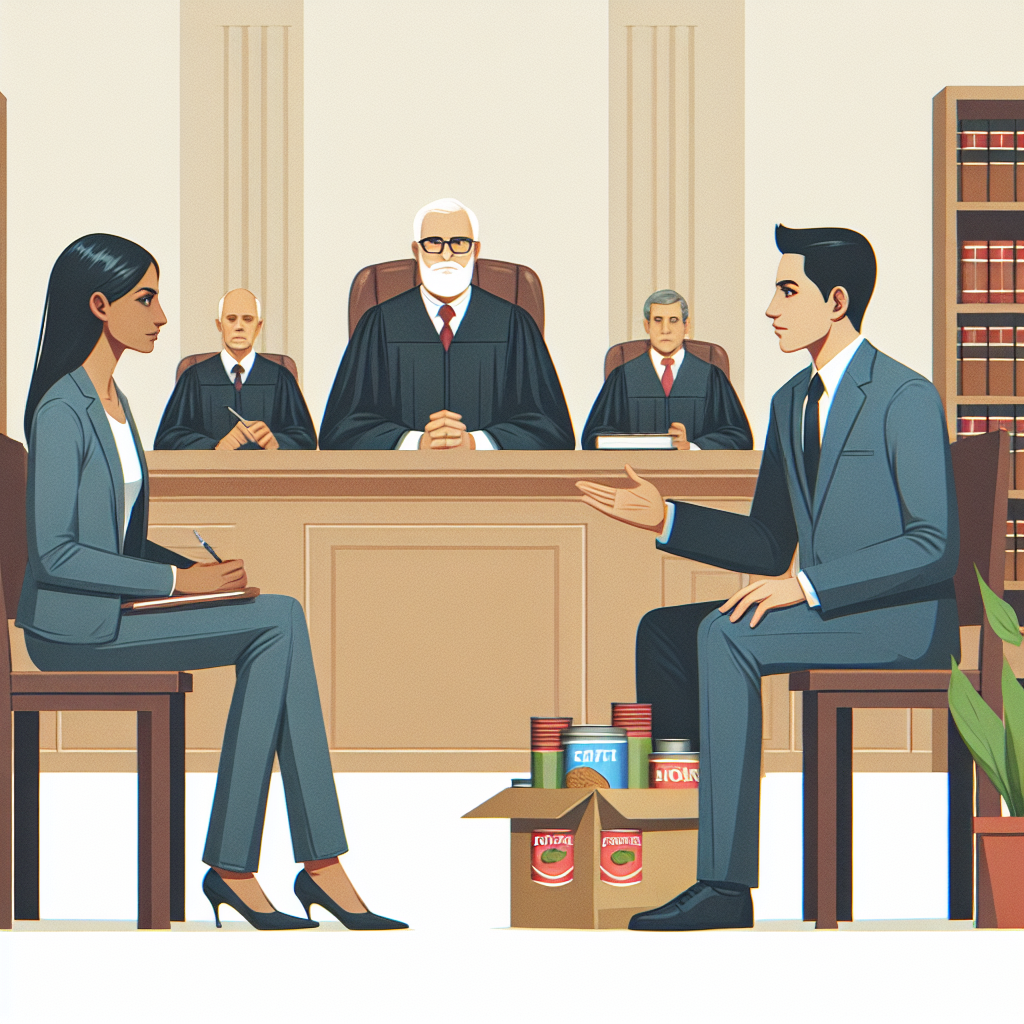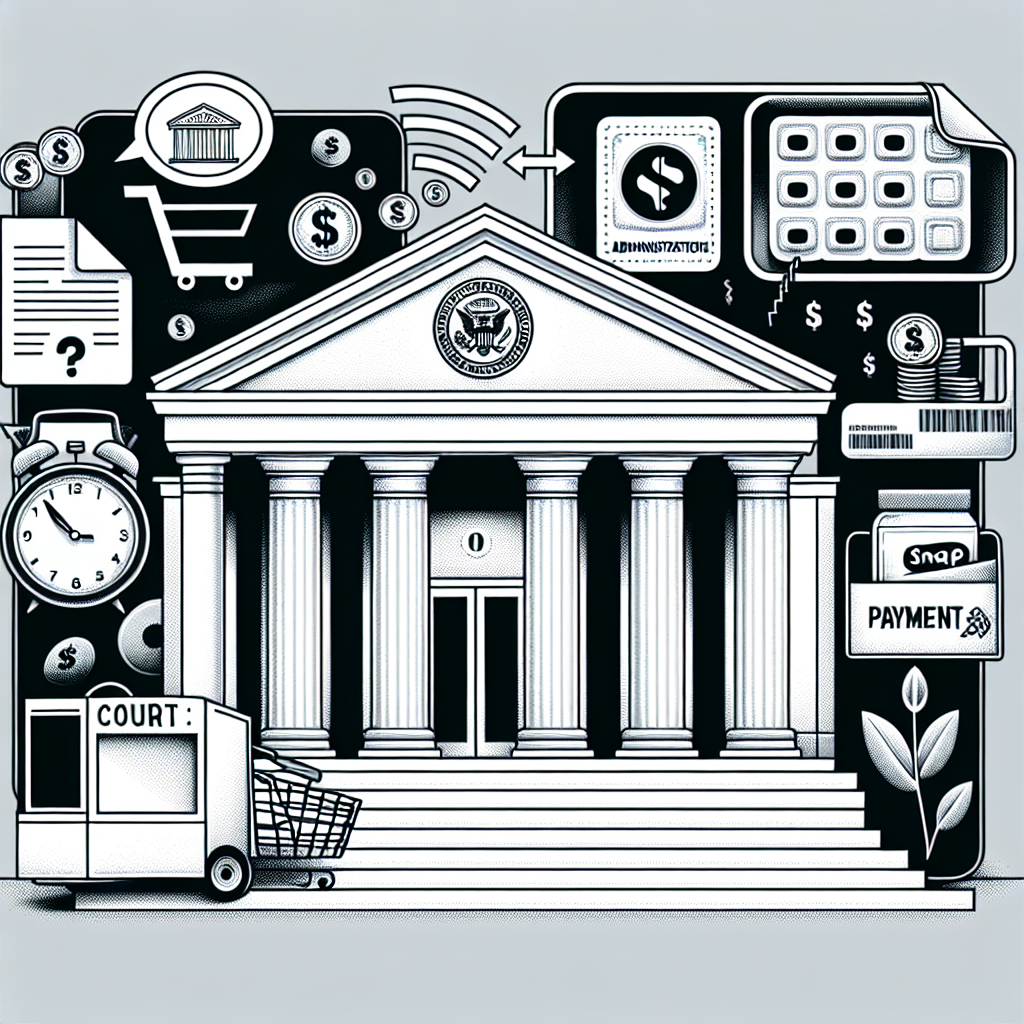In a significant legal maneuver, the Trump administration has requested the U.S. Supreme Court to intervene and pause a ruling made by a federal judge in Rhode Island concerning the funding of the Supplemental Nutritional Assistance Program (SNAP) for November. This request comes in light of a recent order from U.S. District Judge John J. McConnell, Jr., which mandates that the government allocate $4 billion to ensure the full funding of SNAP. The Solicitor General, D. John Sauer, criticized the ruling as an unprecedented challenge to the separation of powers, arguing that the crisis resulting from the government shutdown is one that requires congressional action rather than judicial intervention.
Background of the SNAP Funding Crisis
The SNAP program, which provides essential food assistance to millions of Americans, relies on annual appropriations from Congress. As of now, the program is fully funded through September 30, 2025, but there has been no appropriation for the fiscal year 2026. This funding gap has led to a suspension of benefits for November, as announced by the U.S. Department of Agriculture (USDA), which administers the program. The USDA’s decision was prompted by the ongoing government shutdown, which has left many dependent on SNAP in a precarious situation.
In response to the USDA’s announcement, various nonprofits and municipalities took legal action, asserting that the suspension of benefits was in violation of federal laws governing administrative agencies. They contended that the USDA should utilize emergency funds to cover the November benefits. Judge McConnell initially provided the Trump administration with two options: to either make partial payments from the emergency funds or to fully fund the November benefits from alternative sources. The administration opted for the former, but the judge later mandated the latter, leading to the administration’s appeal.
Legal Arguments and Implications
Solicitor General Sauer’s legal argument emphasizes that the funding crisis is a result of congressional failure, asserting that it should be resolved through legislative means rather than judicial orders. He characterized the judge’s ruling as a significant overreach, arguing that it undermines the established separation of powers between the branches of government. The administration’s request for an administrative stay aims to halt the enforcement of the ruling while the Supreme Court considers its implications.
The urgency of this matter is underscored by the approaching deadlines for SNAP benefits, which affect millions of families across the nation. If the Supreme Court grants the administration’s request, it could delay the implementation of the ruling, allowing the government time to seek a legislative solution. However, if the ruling is upheld, it could set a precedent for future cases where judicial intervention is sought to ensure the funding of essential government programs.
Next Steps and Potential Outcomes
As the situation unfolds, the Supreme Court’s decision will be pivotal in determining the future of SNAP funding amidst the ongoing government shutdown. The court is expected to weigh the legal arguments presented by both the Trump administration and the opposition, which includes various advocacy groups and local governments. The outcome could have far-reaching implications for the SNAP program and its beneficiaries.
In light of this legal battle, many are advocating for a more stable funding mechanism for SNAP that would prevent such crises from arising in the future. Ensuring consistent funding for programs like SNAP is essential for maintaining the welfare of vulnerable populations, particularly during times of economic uncertainty. Stakeholders are now looking to Congress to act swiftly to provide clarity and support for the program.

- trump administration corruption has raised concerns about the integrity of federal programs.
- The ongoing situation regarding trump tariffs court cases further illustrates the complexities of executive actions.
The ongoing legal battle surrounding the Supplemental Nutritional Assistance Program (SNAP) has intensified as the Trump administration seeks intervention from the Supreme Court. This recent appeal is a response to a federal ruling that mandates the government to allocate $4 billion for November SNAP payments. U.S. Solicitor General D. John Sauer has expressed concerns regarding the implications of this ruling, arguing that it undermines the established principles of separation of powers.
Details of the Legal Challenge
The appeal to the Supreme Court follows a decision by U.S. District Judge John J. McConnell, Jr., who ordered the government to fully fund the SNAP program for November. Sauer characterized this order as “unprecedented” and stated that it creates a crisis that stems from a failure in congressional appropriations rather than executive shortcomings. He emphasized that resolving this funding issue is a matter that requires legislative action, not judicial intervention. This situation arose after the U.S. Department of Agriculture announced the suspension of benefits due to the ongoing government shutdown, which has left many families in a precarious position.
Implications of the Federal Ruling
The federal ruling has significant implications for both the administration and the millions of Americans who rely on SNAP benefits. By compelling the administration to utilize emergency funds to cover November payments, the court’s decision raises questions about the limits of judicial power in fiscal matters. The Trump administration’s argument hinges on the assertion that the funding lapse is a direct result of congressional failure to act, a point that has been echoed in various legal contexts. This situation has led to increased scrutiny of the legislative processes that underpin SNAP funding, as well as the role of the judiciary in enforcing these processes.
Next Steps in the Legal Process
Following the district court’s ruling, the Trump administration quickly appealed to the U.S. Court of Appeals for the 1st Circuit. The Solicitor General requested an administrative stay to halt the district court’s order while the appeal is considered. This legal maneuver is critical for the Trump administration as it seeks to prevent immediate financial repercussions that could affect vulnerable populations. The outcome of this appeal could set a precedent regarding the balance of power between the branches of government, particularly in matters of funding and resource allocation.
Potential Consequences for SNAP Recipients
The potential consequences of these legal proceedings extend beyond the courtroom. If the Supreme Court decides to intervene and grants the request for a stay, it could delay the disbursement of funds to those in need. Many families depend on SNAP for their daily sustenance, and any interruption in benefits could lead to increased food insecurity. As the legal process unfolds, the implications for SNAP recipients remain a pressing concern for advocates and policymakers alike. The administration’s approach to this situation will likely influence public perception and could have lasting effects on future funding for the program.

In this context, the Trump administration’s legal strategy is not merely about funding; it reflects a broader struggle over the interpretation of federal authority and the role of the courts in fiscal matters. The debate surrounding SNAP funding is emblematic of larger discussions about government accountability and the responsibilities of different branches of government. As this case progresses, it will be crucial to monitor how it shapes both policy and public discourse regarding social safety nets.
For those interested in the legal aspects of this case, the trump administration lawsuit highlights the complexities involved in such high-stakes legal battles. Additionally, the implications of judicial decisions on executive power can be seen in other cases, such as the trump administration supreme court cases. Furthermore, the ongoing discussions about Trump’s legal disqualification underscore the intricate relationship between law and governance, as noted in discussions surrounding trump legal disqualification issues.
The ongoing legal battle surrounding the funding of the Supplemental Nutrition Assistance Program (SNAP) has escalated as the Trump administration seeks intervention from the Supreme Court. Following a ruling from U.S. District Judge John J. McConnell, Jr. in Rhode Island, the administration has urged the Supreme Court to pause the order that mandates the government to allocate $4 billion for SNAP benefits for November. This situation arises amidst a government shutdown and highlights the tension between executive actions and judicial mandates concerning federal funding.
Background of the SNAP Funding Crisis
The SNAP program, which provides essential food assistance to millions of Americans, relies on annual appropriations from Congress. As of September 30, 2025, the program had sufficient funding, but the absence of an appropriation for the 2026 fiscal year has led to a funding lapse. The U.S. Department of Agriculture (USDA) announced on October 24 that due to the government shutdown, benefits for November would be suspended. This decision was met with significant pushback from various nonprofit organizations and municipalities, leading them to file a lawsuit in federal court.
In their legal challenge, these groups contended that the suspension of SNAP benefits violated federal laws governing administrative agencies. Judge McConnell’s initial ruling provided the Trump administration with options: either to make partial payments from emergency funds or fully fund the November benefits from alternative sources. The administration opted for partial payments initially, but the judge later mandated that the full amount be paid by the deadline.

Legal Implications and the Supreme Court’s Role
Solicitor General D. John Sauer’s request to the Supreme Court highlights the administration’s concern regarding the ruling’s implications for the separation of powers. He characterized the judge’s order as “unprecedented” and a potential overreach of judicial authority. In his argument, Sauer acknowledged the crisis created by the lapse in funding but insisted that it was a result of congressional failure, asserting that only legislative action could remedy the situation.
This legal maneuvering underscores the complexities of federal funding and the interplay between different branches of government. The Supreme Court’s decision to grant or deny the administrative stay will have significant ramifications for the SNAP program and those reliant on its benefits. Additionally, it raises questions about the extent of judicial power in dictating executive funding decisions during periods of governmental impasse.
Potential Outcomes and Consequences
If the Supreme Court decides to pause the ruling, it could provide temporary relief to the Trump administration and allow for further deliberation on the matter. Conversely, if the court upholds the lower court’s decision, it may compel the administration to find immediate solutions to fund the SNAP program, potentially impacting millions of beneficiaries.
As this case unfolds, it remains to be seen how the judicial system will navigate the complexities of federal funding and the implications of government shutdowns on essential social programs. The outcome will not only affect the SNAP program but may also set precedents for future interactions between the legislative and judicial branches concerning funding and administrative authority.
For further insights on the balance of power between the executive and judicial branches, consider exploring the trump tariffs supreme court case, which illustrates similar tensions in federal governance.